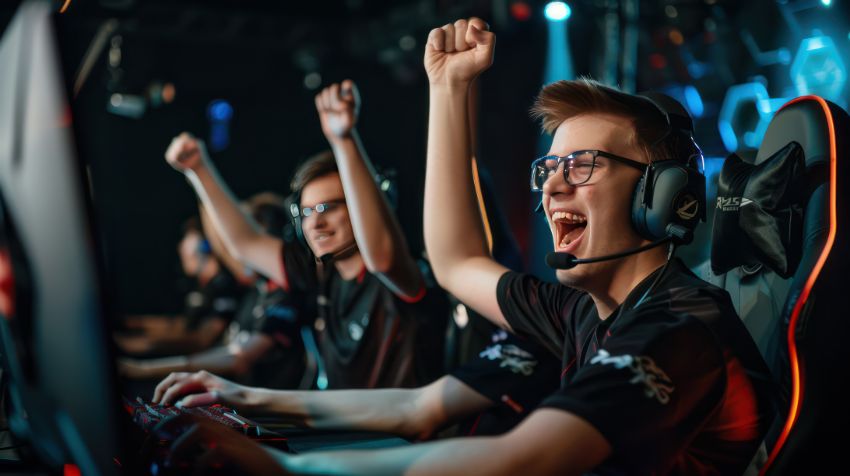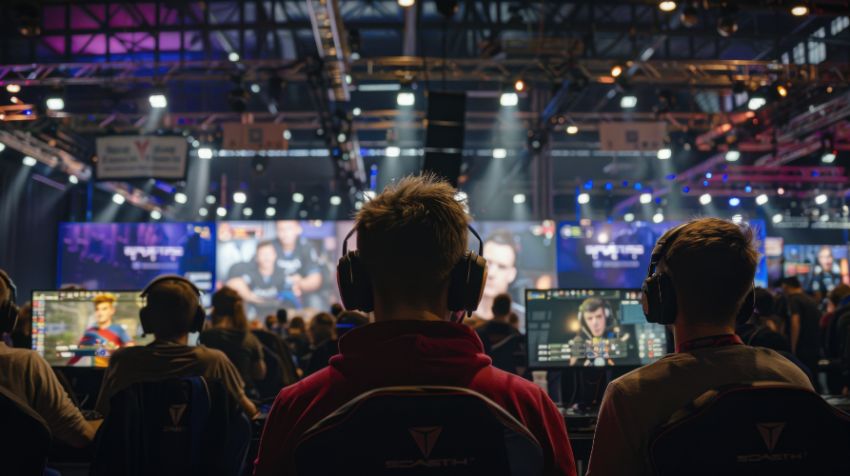Esports tournaments have evolved significantly since their inception in the 1970s, transitioning from small, informal gatherings into large-scale global events.
Understanding the various tournament formats, such as single-elimination and round-robin, is crucial for comprehending how these competitions function.
Games like League of Legends and Dota 2 attract millions of fans and host major international events with substantial prize pools.
Analyzing the factors that contribute to the success of esports teams reveals several key elements, including strategic planning, teamwork, and individual skill.
These components are essential for achieving victory in the competitive esports landscape.
Key Takeaways
- Esports tournaments can use formats like single-elimination or round-robin, each with distinct advantages.
- Major esports events include The International, League of Legends Worlds, and Intel Extreme Masters.
- Popular esports titles include League of Legends, Dota 2, and CS:GO.
- Prize pools in esports tournaments often reach millions, attracting top talent.
- Sponsorships from major brands significantly support esports tournaments financially.
Evolution of Esports
Esports have undergone significant evolution over the past few decades. Competitive gaming has origins dating back to the 1970s with small gatherings and arcade tournaments, where players competed for high scores on games such as Space Invaders and Pac-Man.
During the 1990s, the rise of the internet facilitated a substantial change in gaming. This period marked the advent of multiplayer online games. Titles like Quake and StarCraft served as foundational elements for organized competitions. These games enabled players to connect and compete from different geographical locations, contributing to the initial traction of esports.
In the 2000s, esports began to enter the mainstream. Companies started to recognize the potential of gaming as a spectator sport. Major tournaments, including the World Cyber Games and the Electronic Sports World Cup, emerged during this time. These events attracted considerable audiences and offered substantial prize pools, reinforcing the status of esports in popular culture.
Presently, esports is a global phenomenon. It includes professional leagues, significant sponsorships, and millions of fans worldwide, reflecting the substantial progress competitive gaming has made.
Popular Tournament Formats
When exploring popular tournament formats in esports, you’ll often encounter the single-elimination structure and round-robin play.
Single-elimination is straightforward, with losing teams immediately out, while round-robin guarantees each team plays against every other team.
Understanding these formats helps you appreciate the strategic depth and excitement in esports competitions.
Single-Elimination Structure
A single-elimination structure, commonly utilized in competitive gaming, is a straightforward format frequently employed in esports tournaments. In this arrangement, teams or players compete in a series of matches where the loser is immediately eliminated from the tournament. The winner of each match advances to the next round, and this process continues until only one champion remains.
This format maintains a high level of engagement and competition, as each match is critical and there are no opportunities for recovery after a loss. The absence of a second chance can create a tense environment for both participants and spectators.
The straightforward nature of single-elimination allows for easy tracking of the tournament’s progress, which helps maintain audience interest throughout the event. Organizers often prefer this structure due to its efficiency. It necessitates fewer matches compared to other formats, making it suitable for events with time or resource constraints.
However, a significant drawback is that a single mistake can result in the early elimination of even the most skilled teams, potentially not reflecting their true abilities. Despite this limitation, the single-elimination format remains a popular choice due to its clear and conclusive nature.
Round-Robin Play
Round-robin play is commonly used in esports tournaments due to its perceived fairness and comprehensive evaluation of participants’ skills. In this format, each team or player competes against every other participant at least once. This ensures a thorough assessment of all competitors’ abilities, as no one is eliminated after a single loss. Instead, participants accumulate points based on their performance in each match.
The round-robin format emphasizes consistency over time, rewarding participants who perform well across a series of games rather than just in a few critical matches. This is particularly advantageous in games where variables such as map selection or random events can significantly affect outcomes. By competing in multiple matches, the influence of luck on the final results is minimized.
However, it’s important to note that round-robin tournaments can be time-consuming. The necessity for each participant to play against all others results in a high total number of matches, especially in tournaments with many participants.
Nevertheless, the depth and thoroughness of this format often justify the time investment. For those seeking a tournament structure that ensures the most skilled team or player emerges as the winner, round-robin play is a suitable choice.
Key Esports Titles
Esports has become a significant global industry, driven by key titles that attract large audiences and intense competition. Prominent games such as “League of Legends,” “Dota 2,” and “Counter-Strike: Global Offensive” (CS:GO) play crucial roles in this landscape. These titles are more than just games; they encompass complex ecosystems with professional teams, strategic depth, and substantial fan bases.
“League of Legends,” developed by Riot Games, is a multiplayer online battle arena (MOBA) game that has garnered a significant following due to its fast-paced gameplay and strategic intricacies.
Similarly, “Dota 2,” another MOBA by Valve, is recognized for its challenging learning curve and high-stakes prize pools, with its annual tournament, The International, often exceeding $30 million in rewards.
“Counter-Strike: Global Offensive” (CS:GO), also by Valve, is a first-person shooter that emphasizes tactical teamwork and precise aiming.
Each of these titles has established a distinct presence within the esports sector, contributing significantly to its expansion. They offer varied experiences but share core elements such as skill, strategy, and community engagement, making them foundational to the esports domain.
For those exploring esports, these titles provide a fundamental understanding of the competitive environment.
Major Global Events
Global events play a crucial role in the esports industry, serving as platforms where top-tier talent and fans converge. These tournaments attract significant viewership, both online and in person.
One of the most notable events is The International for Dota 2. This annual tournament, organized by Valve, features leading teams vying for the Aegis of Champions.
In the realm of League of Legends, the World Championship, commonly referred to as Worlds, represents the apex of competitive play. Riot Games ensures that each iteration of the event is more elaborate than its predecessor, with teams from various regions competing for the Summoner’s Cup.
The Intel Extreme Masters (IEM) is another prominent series, covering multiple games and locations globally. IEM Katowice is particularly significant, often likened to the “Super Bowl” of esports.
Additionally, the Overwatch League Grand Finals bring together teams from around the world to compete in Blizzard’s popular shooter.
Each of these events highlights the highest level of competitive play, making them essential viewing for esports followers.
By the way, take a look at our article https://bet-of-the-day.net/2024/10/02/exploring-the-world-championship-events-in-esports/
Prize Pools and Sponsorships
Prize pools and sponsorships are critical components of esports tournaments, elevating them from niche events to widely recognized spectacles. Large prize pools attract top-tier talent and capture the attention of a global audience. These pools can reach substantial amounts, sometimes in the tens of millions, positioning esports as a highly lucrative sector within the entertainment industry.
Sponsorships are equally important. By partnering with major brands, tournament organizers can secure funding, enhance production quality, and provide better amenities for players. Various industries, including technology, beverages, and automotive companies, are increasingly interested in associating with esports.
These sponsorships create a mutually beneficial relationship, where brands gain exposure to a dedicated audience, and tournaments achieve financial stability and enhanced credibility.
The impact of prize pools and sponsorships extends beyond financial aspects. They raise the stakes for players, motivating them to perform at their highest level. The prospect of significant financial rewards incentivizes participants and adds an extra layer of engagement for fans.
Without these financial foundations, the dynamic landscape of esports would be considerably different.
If you are interested in The Role of Sponsorships in Esports, read this article:https://bet-of-the-day.net/2024/10/02/the-role-of-sponsorships-in-esports/
Strategies for Success
Navigating the competitive landscape of esports requires more than just innate skill; it necessitates a comprehensive strategy. Initially, it’s crucial to master the game mechanics. This involves dedicating time to understanding the intricacies of the chosen game, such as character abilities, map layouts, and in-game economies.
Teamwork and communication are also essential components. Esports often involve team-based play, requiring players to practice together to build synergy and trust. Effective communication can significantly impact the outcome of matches, making it important to be clear and concise.
Analyzing opponents is another critical aspect. Reviewing replays of their matches can help identify patterns and weaknesses. This information can be used to anticipate their strategies and develop effective countermeasures.
Maintaining mental and physical well-being shouldn’t be overlooked. Regular breaks, a balanced diet, and physical exercise can enhance focus and stamina. Mental resilience is also important, as it helps maintain composure under pressure, which is crucial in high-stakes situations.
Finally, adaptability is key. The meta, or most effective tactics available, can change with updates and patches. Staying informed about these changes and adjusting strategies accordingly is necessary for sustained success in esports.
Conclusion
You’ve now got a solid grasp of esports tournaments, from their humble beginnings to their current global status. You’ve learned about different formats, key games, and the significance of major events, prize pools, and sponsorships. Remember, success in this rapidly growing field hinges on mastering game mechanics and teamwork. Whether you’re a player, fan, or aspiring professional, understanding these elements will help you navigate and thrive in the exciting world of esports.



